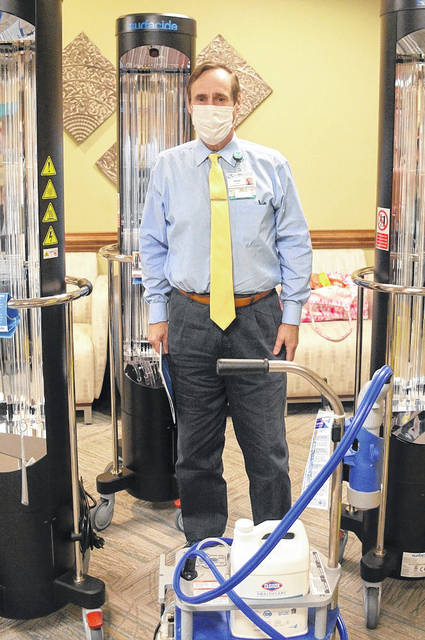LAURINBURG — Before COVID-19, hospital housekeepers already worked hard to make sure everything was sanitized and free of germs, but now they’re following an even stricter schedule.
Environmental Services at Scotland Health Care has transitioned from cleaning three times a day to having to clean every two hours, making for long work hours disinfecting rooms, chairs and doors.
“Routine cleaning is the everyday cleaning practices that hospitals and urgent care normally use to maintain a healthy environment,” said EVS Director Dwane Fizer. “Surfaces frequently touched by multiple people, such as door handles, bathroom surfaces and handrails should be cleaned with a germicidal disinfected at least daily when facilities are in use. More frequent cleaning and disinfection may be required based on the level of use.
“For example, certain surfaces and objects in public spaces, such as elevators, stairwells, points of entry and waiting areas, should be cleaned and disinfected before each use,” Fizer continued. “Thus these areas of concentration are disinfected every two hours. Cleaning removes dirt and impurities, including germs, from surfaces. Cleaning alone does not kill germs, but it reduces the number of germs on a surface.”
Fizer added that EVS are the infection preventers for all facilities, as they are cleaning not just the public areas but also cleaning in the rooms with COVID patients.
“The environmental services team members are truly unsung heroes in our journey to overcome the COVID-19 pandemic,” Fizer said. “After months on the front lines of the COVID-19 pandemic, environmental service professionals have served as a source of comfort for patients not able to see loved ones, while maintaining rooms to the highest standards of cleanliness.”
Cleaning for viruses that can live on a surface for days, if not months, is nothing new for EVS. It has dealt with cleaning MRSA, hepatitis and even the flu — which can stay in a dormant state on surfaces for months before becoming actively infectious again.
“It can be overwhelming,” Fizer said. “But we’re experts in the cleanup of communicable disease-causing organisms. There are often unexpected consequences to bacteria and viruses when they are not properly disinfected. We know how to account for and disinfect them to ensure that our hospital is properly disinfected … because even small traces of bacteria or viruses can present these risks, we don’t stop until a scene is safe, even if that means the removal of sections of carpet, flooring, or other materials.
“Our attention to detail requires the safe removal of even microscopic organic materials to stop the spread of communicable disease.”
The hospital has also implemented new state-of-the-art equipment to help kill COVID-19 including “Surfacide” a UV-C decontamination technology and the Clorox “Total 360 System” which is an electrostatic sprayer. Both pieces of equipment can quickly clean a room and completely kill any traces of COVID-19.
Katelin Gandee can be reached at [email protected].


